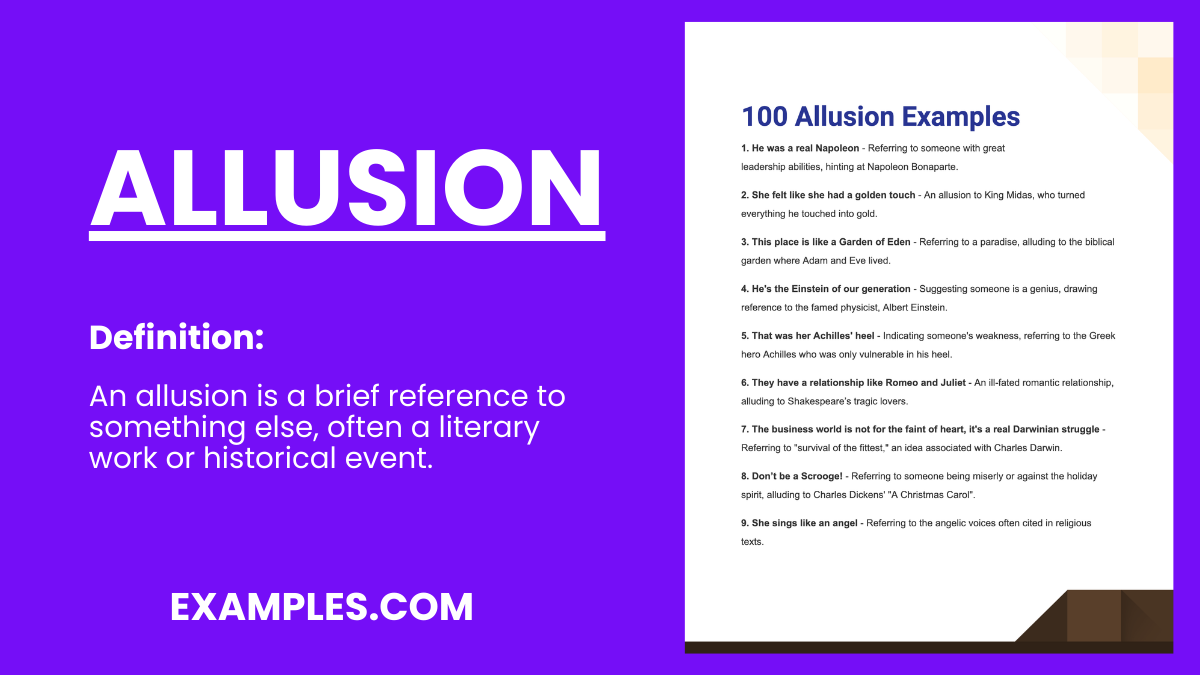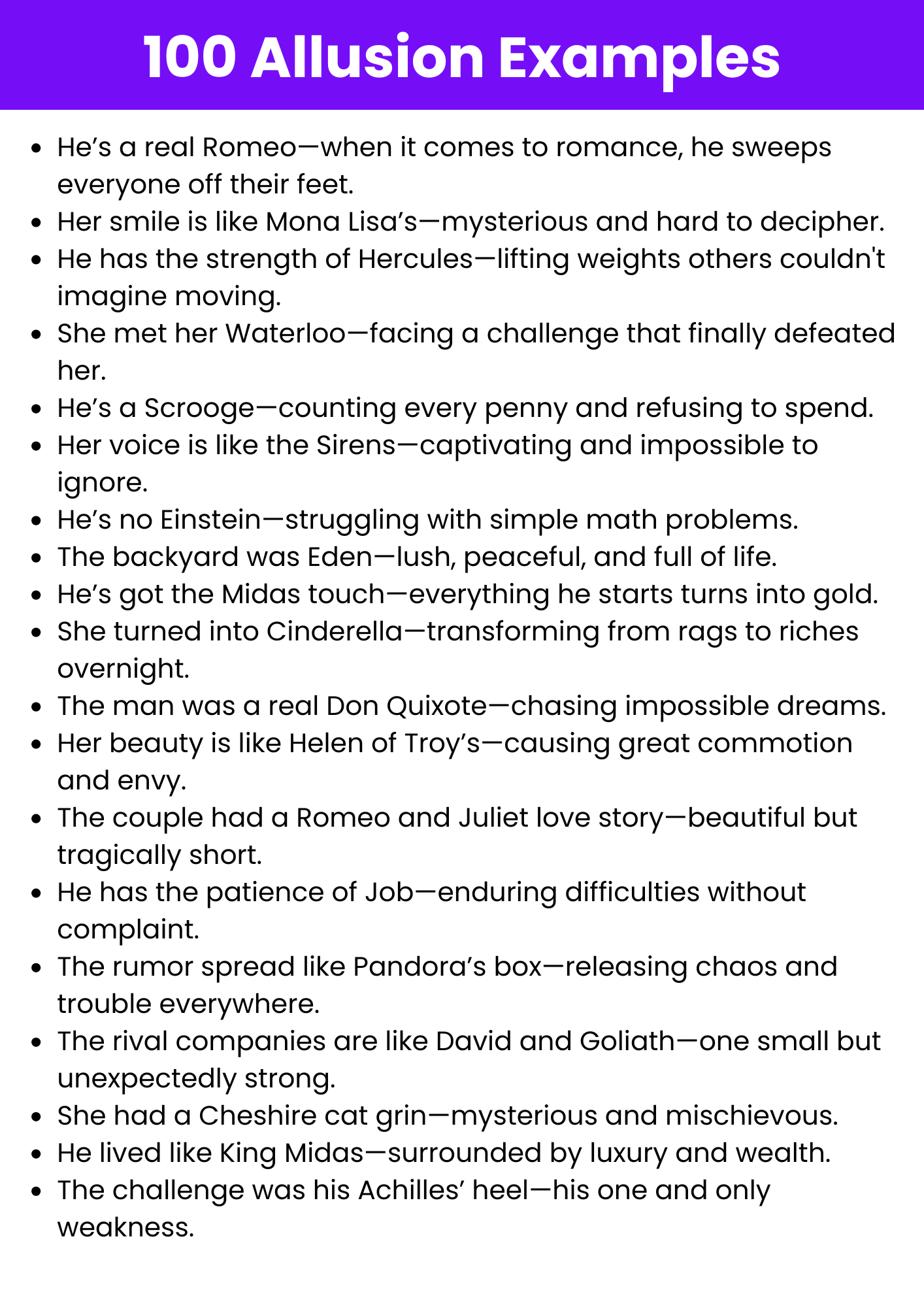Allusion
What is Allusion? – Definition
An allusion makes an indirect reference to a person, place, thing, event, or another piece of literature. It relies on the reader’s familiarity with what is mentioned, enhancing the meaning or context without detailed explanation.

Generated Allusion Examples

Download Allusion Examples
Enhance your understanding with our comprehensive PDF guide.
Download PDFExamples of Allusions
- He was a real Romeo with the ladies.
- She met her Waterloo during the finals.
- The meeting was a Jackson Pollock of ideas.
- He’s a modern-day Don Quixote, chasing impossible dreams.
- Her smile was like the Mona Lisa’s enigmatic expression.
- Their rivalry was a clash of titans.
- His sudden departure was a classic case of leaving in the nick of time.
- Their new project was a Pandora’s box of challenges.
- Time slipped away like sand through an hourglass.
- Navigating the bureaucracy was like entering the labyrinth.
- He approached the task with Herculean effort.
- Her ideas were a breath of fresh air.
- He found himself in a David and Goliath battle.
- Their teamwork was like the Twelve Olympians working together.
- His leadership style was that of King Arthur.
- Her sudden insight was an Einstein moment.
- Entering the negotiations felt like stepping into Middle Earth.
- Her resilience was a phoenix rising from the ashes.
- He was a modern-day Prometheus, bringing fire to humanity.
- Their friendship was a beacon of hope in dark times.
- Her sudden insight was an Einstein moment.
- His calm demeanor was reminiscent of Gandalf.
- Her leadership was the North Star guiding the team.
- His determination was a force of nature.
- Their journey was like Odysseus navigating the seas.
- His wisdom was a Midas touch, turning ideas into gold.
- Her creativity was a Pandora’s box, full of surprises.
- The project felt like walking on thin ice.
- His sudden change of heart was a twist of fate.
- Her quick thinking was a lightning bolt of brilliance.
Types of Allusions
Concrete Allusions
Direct and specific references to well-known people, places, events, or works of art and literature.
- Shakespearean allusion – Referencing characters or events from Shakespeare’s plays.
- Biblical allusion – Making references to stories or figures from the Bible.
- Mythological allusion – Referencing myths and legends from various cultures.
- Historical allusion – Referring to historical events or figures.
- Literary allusion – Alluding to other literary works or authors.
Cultural Allusions
References to widely recognized cultural phenomena, such as celebrities, brands, or popular media.
- Referencing a celebrity to convey a particular trait.
- Using a famous sports event to illustrate competition.
- Alluding to a popular movie scene to enhance imagery.
- Referencing a well-known song to evoke emotions.
- Using a popular restaurant brand to symbolize abundance.
Literary Allusion
Indirect references to other literary works, authors, or literary characters.
- Referencing “To be or not to be” from Shakespeare’s Hamlet.
- Alluding to “Pride and Prejudice” to describe a complicated relationship.
- Referencing “Moby Dick” to symbolize an obsessive quest.
- Alluding to “1984” to highlight themes of surveillance.
- Referencing “The Great Gatsby” to depict opulence.
Historical Allusion
References to significant historical events, figures, or periods to add depth or context.
- Mentioning the Titanic to emphasize a tragic failure.
- Referencing the Renaissance to highlight a period of rebirth.
- Alluding to the Cold War to suggest ongoing tension.
- Referencing the fall of the Berlin Wall to symbolize freedom.
- Alluding to the Great Depression to discuss economic hardship.
Biblical Allusion
Indirect references to stories, characters, or themes from the Bible, often used to convey moral or ethical messages.
- Referring to someone as a “Good Samaritan” to highlight kindness.
- Using “Noah’s Ark” to symbolize salvation amidst chaos.
- Calling a difficult situation a “Job’s trial” to denote perseverance.
- Referring to someone as a “Moses of their community” to indicate leadership.
- Using “Garden of Eden” to describe a pristine or idyllic place.
Literary Allusion
Indirect references to other literary works, authors, or literary characters.
- Referencing “To be or not to be” from Shakespeare’s Hamlet.
- Alluding to “Pride and Prejudice” to describe a complicated relationship.
- Referencing “Moby Dick” to symbolize an obsessive quest.
- Alluding to “1984” to highlight themes of surveillance.
- Referencing “The Great Gatsby” to depict opulence.
How to Identify/Find Allusion?
To identify allusions, look for phrases or references that hint at well-known works, events, or figures without explicitly mentioning them. Allusions rely on the reader’s prior knowledge to understand the deeper meaning or context.
- Look for indirect references to famous people, places, or events.
- Identify phrases that suggest a connection to well-known literary or cultural elements.
- Check if the reference enhances the understanding or adds depth to the subject.
- Notice if the reference evokes imagery or emotions associated with the alluded subject.
- Look for subtle hints that require the reader to make connections beyond the text.
How to Use Allusion?
Use allusions to enrich your writing by drawing connections between your content and well-known references. Ensure that your allusions are relevant and enhance the reader’s understanding or emotional response without overcomplicating the narrative.
- Choose references that resonate with your target audience.
- Use specific and recognizable allusions to make your point effectively.
- Integrate allusions seamlessly into your narrative or argument.
- Ensure the allusion enhances the reader’s understanding or emotional connection.
- Avoid overusing allusions to maintain their impact and clarity.
Other Allusion Examples
Allusions in Daily Life
Daily life is filled with allusions that help us convey our thoughts, feelings, and experiences more vividly.
- He has a heart of stone.
- Her voice is music to my ears.
- His words cut deeper than a knife.
- Laughter is the best medicine.
- The world is your oyster.
Allusion Examples for Kids
Introduce children to the enchanting world of kid-friendly allusions with relatable references like “smile is sunshine” or “friendship is a warm blanket.”
- The clouds are cotton candy.
- Her smile is sunshine.
- The playground is a jungle.
- His room is a tornado.
- The stars are diamonds in the sky.
Allusion Examples for Students
Empower students with allusions that make learning engaging. Discover how “studying fuels the brain’s engine” and “creativity is a toolbox of colorful ideas.”
- Knowledge is a light in the dark.
- The classroom is a hive of activity.
- Books are keys to wisdom’s treasure.
- Homework is a mountain to climb.
- The mind is a powerful engine.
Allusion Examples for Poems
Rich and evocative allusions that enhance the beauty and imagery in poetic language.
- The night is a velvet cloak.
- Hope is a fragile feather.
- The sky is a canvas of dreams.
- Words are pearls strung together.
- Silence is a heavy blanket.
Hidden Personification Allusion Examples
Creative allusions that bring inanimate objects or nature to life by giving them human-like qualities.
- The sun smiled down on us.
- The flowers danced in the breeze.
- The ocean roared with anger.
- The fire licked the air hungrily.
- The city never sleeps.
Allusion Examples About a Tree
Descriptive allusions that depict trees as more than just plants, highlighting their strength, beauty, and presence.
- The tree is a giant umbrella.
- The bark is a warrior’s armor.
- The tree is a silent sentinel.
- The trunk is a sturdy pillar.
- The sap is the tree’s lifeblood.
Allusion Examples About Love
Passionate and expressive allusions that capture the intensity and essence of love in all its forms.
- Love is a burning flame.
- Love is a rollercoaster ride.
- Love is the glue that binds us.
- Love is a storm, wild and free.
- Love is a garden that needs care.
Explore Other Literary Devices
Elevate Your AP English Preparation
Unlock your potential with our comprehensive AP English exam preparation tools designed to help you excel.
- Extensive Question Bank: Access 900+ exam-like questions for both AP English Language and Literature.
- Expertly Crafted: Questions mirror the structure and difficulty of actual AP exams, ensuring relevant practice.
- Detailed Explanations: Understand your mistakes with clear, concise breakdowns of correct and incorrect answers.
- Personalized Learning: Tailor your study sessions with topic-specific tests and adaptive learning tools.
- Comprehensive Coverage: Master all aspects of the AP English curriculum with extensive guides and resources.
Frequently Asked Questions
-
How does an allusion differ from a metaphor?
While a metaphor directly compares two things by stating one is the other, an allusion indirectly references something else without making a direct comparison, relying on the reader’s prior knowledge. -
What are common types of allusions?
Common types include Biblical allusions, mythological allusions, historical allusions, and literary allusions to famous works or characters. -
What are some common examples of allusion?
Common examples include referencing classical mythology like saying someone is a “Hercules,” or mentioning literary works, such as referring to a “Big Brother” from Orwell’s “1984.” -
How can I identify allusion in a text?
To identify an allusion, look for references to well-known figures, events, or works that enhance the text’s meaning. Understanding the cultural or historical background can help recognize subtle allusions. -
Can allusions be found in everyday conversations?
Yes, allusions often appear in everyday speech. For example, saying someone is “a real Romeo” alludes to Shakespeare’s character, implying they are romantic.

